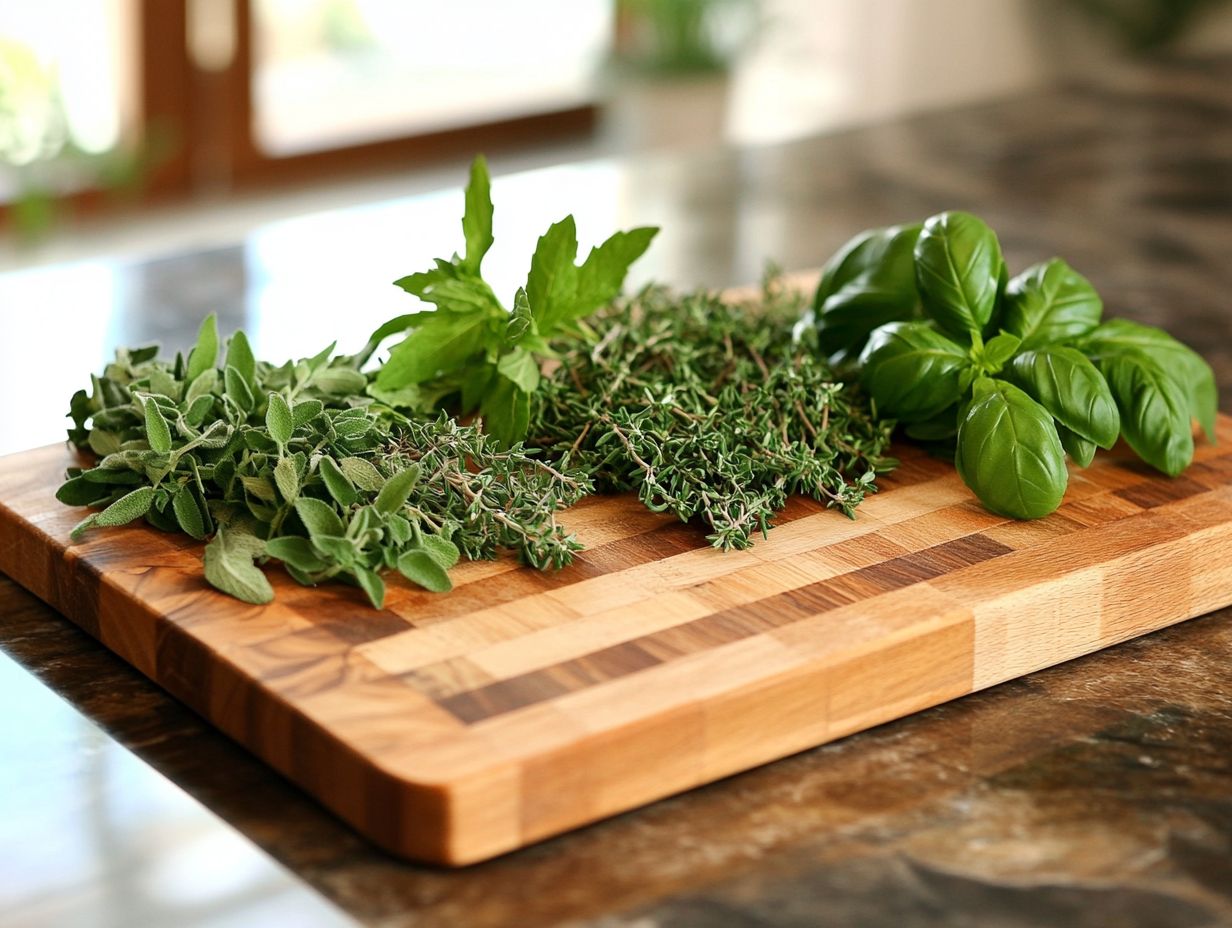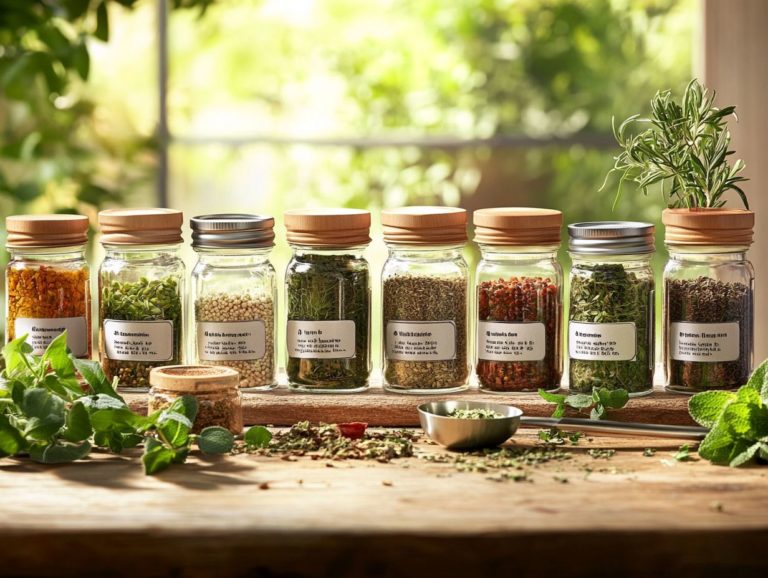5 Common Herbs and Their Safe Dosages
Herbs have long been celebrated, not just for their delightful flavors but also for their remarkable health benefits.
This article delves into five common herbs garlic, ginger, turmeric, cinnamon, and ashwagandha that can elevate your well-being. It covers their therapeutic properties, recommended dosages, potential side effects, and safe usage, including any interactions with medications you should be aware of.
Whether you aim to add a dash of flavor to your meals or enhance your health, this guide offers valuable insights on how to seamlessly integrate these powerful herbs into your daily routine.
Contents
- Key Takeaways:
- 1. Garlic
- 2. Ginger
- 3. Turmeric
- 4. Cinnamon
- 5. Ashwagandha
- What Are the Health Benefits of These Herbs?
- What Are the Recommended Dosages for Each Herb?
- What Are the Potential Side Effects of These Herbs?
- Can These Herbs Interact with Other Medications?
- How to Add Herbs to Your Meals
- Are There Any Precautions to Take When Using These Herbs?
- Is It Safe to Use These Herbs for Children and Pregnant Women?
- How Can One Determine the Quality of These Herbs?
- What Are the Different Forms of These Herbs and Their Recommended Dosages?
- What Are the Best Ways to Store These Herbs for Maximum Shelf Life?
- What Are the Possible Interactions Between These Herbs?
- How Can One Use These Herbs for Specific Health Conditions?
- What Are the Common Myths About These Herbs?
- How Can One Incorporate These Herbs into Their Daily Routine?
- Are There Any Risks Associated with Long-Term Use of These Herbs?
- Frequently Asked Questions
- What are the 5 most commonly used herbs and what are their safe dosages?
- What is the recommended dosage for ginger?
- Can I take garlic in higher doses for its health benefits?
- What are the safe dosages for turmeric and cinnamon?
- Can I consume peppermint tea in unlimited quantities?
- Are there any risks associated with using these herbs?
Key Takeaways:

- Always follow recommended dosages to avoid potential side effects when using garlic, ginger, turmeric, cinnamon, and ashwagandha.
- Be cautious when combining these herbs with other medications as they may interact and affect their effectiveness.
- Incorporate these herbs into your diet and daily routine in a safe and balanced manner for optimal health benefits.
1. Garlic
Garlic, scientifically known as Allium sativum, brings a wealth of health benefits that have been cherished in traditional medicine for centuries. This amazing herb not only adds flavor but also offers incredible health boosts!
The magic lies in allicin, a compound released when you crush or chop garlic. Experts, like herbalist Lindsay Curtis, emphasize garlic’s impressive ability to strengthen your immune system, enabling your body to better ward off infections.
Research conducted by Arno Kroner shows that incorporating garlic into your diet can significantly lower blood pressure and cholesterol levels, leading to enhanced cardiovascular health. Its natural antibacterial properties further boost your overall wellness, making garlic a great way to add to your meals.
With a rich history rooted in traditional healing, this humble bulb remains a formidable ally in your quest for better health.
2. Ginger
Ginger, a highly esteemed medicinal plant, is known for its remarkable health benefits, particularly in easing digestive issues and reducing inflammation. This makes it an essential herb in both culinary and medicinal realms.
Its active compounds, like gingerol, contribute to its anti-inflammatory and antioxidant properties properties that help protect your cells from damage offering a range of health advantages that include relief from nausea and even potential cancer-fighting capabilities.
Research indicates that ginger effectively alleviates symptoms of indigestion and bloating, making it a go-to remedy for upset stomachs. A study published in the Journal of Gastroenterology reveals that ginger can significantly enhance gastrointestinal motility. It s lauded for its anti-inflammatory role, with the University of Alabama highlighting its promise in addressing chronic inflammatory conditions like arthritis.
For immune support, this herb bolsters the body s defenses, with some experts suggesting that it may help reduce respiratory infections.
Start adding fresh ginger to your meals today for a health boost! Consider incorporating it in these ways:
- Add fresh ginger to your smoothies.
- Brew it into soothing teas.
- Use it as a vibrant seasoning in your cooking.
This way, you can reap its extensive health benefits while savoring its unique flavor.
3. Turmeric
Turmeric, or Curcuma longa, is more than just a spice; it s a powerhouse of health benefits. Its active compound, curcumin, is known for impressive anti-inflammatory properties and antioxidant properties. This golden herb supports immune health, reduces inflammation, and even promotes brain health.
As more people recognize turmeric s medicinal potential, its ability to enhance food dishes and overall wellness becomes impossible to ignore!
Diverse cultures have celebrated turmeric for its unique flavor and remarkable capabilities. Modern research increasingly validates its ability to combat chronic inflammation, a common culprit behind many ailments. Researchers are exploring its cognitive benefits, suggesting that adding turmeric to your daily routine may enhance memory and cognitive clarity.
The blend of traditional wisdom and contemporary scientific evidence underscores turmeric’s role as a formidable ally in fostering holistic health and longevity.
4. Cinnamon
Cinnamon is an enchanting spice sourced from the bark of Cinnamomum trees. It s renowned for remarkable health benefits. Cinnamon helps improve blood sugar control and delivers powerful antioxidant properties, making it a splendid addition to your food dishes and medicinal practices.
As you explore natural ways to enhance your well-being, cinnamon stands out for its captivating aroma and flavor. It has a rich history of traditional uses and modern research that champions its health-enhancing qualities. Studies show it can reduce insulin resistance, paving the way for better blood sugar regulation especially if you re navigating diabetes.
Cinnamon also has documented heart health benefits, showing its ability to lower cholesterol levels and promote healthy circulation. Many who include this spice in their daily routine report an overall boost in energy and vitality!
5. Ashwagandha
Ashwagandha, often called Indian ginseng, is your go-to adaptogen herb, celebrated for reducing stress and anxiety. This powerful herb has been a cornerstone of Ayurvedic medicine for centuries. It acts on your body s stress response to promote overall wellness and enhance mental clarity.
Not only does it support immune function, but it also boosts vitality. As its popularity grows in modern wellness practices, ashwagandha s health benefits continue to be validated by both scientific research and traditional wisdom.
Studies show that ashwagandha can significantly lower cortisol levels the hormone responsible for stress helping you manage today s fast-paced world. Experts emphasize its effectiveness in enhancing your body s resilience to stress, making it an invaluable ally in your pursuit of tranquility and mental sharpness.
Researchers also highlight its role in improving cognitive function. By adding ashwagandha to your daily routine, you can experience better focus and improved memory retention. As the relevance of natural remedies grows, ashwagandha shines for its rich history and its solid footing in scientific discussions on holistic health!
What Are the Health Benefits of These Herbs?
The health benefits of herbal supplements, especially those sourced from medicinal plants like garlic, ginger, turmeric, cinnamon, and ashwagandha, are vast. They are essential components of holistic wellness practices.
Research shows that garlic strengthens your immune system. It also helps lower cholesterol levels, supporting heart health.
Ginger is famous for easing nausea, and it enhances nutrient absorption, boosting your overall digestive health. Turmeric, powered by its active compound curcumin, is recognized for its impressive anti-inflammatory effects, making it particularly beneficial for conditions like arthritis.
Cinnamon helps regulate blood sugar levels, especially for those managing diabetes. It is a valuable ally in dietary management. Meanwhile, ashwagandha helps your body cope with stress and fosters mental clarity.
Health experts like Lindsay Curtis and Arno Kroner suggest making these herbs a part of your daily routine for better health.
What Are the Recommended Dosages for Each Herb?

Determining the right dosages for each herbal supplement is crucial. This helps you maximize their health benefits while minimizing potential side effects.
Each herb be it garlic, ginger, turmeric, cinnamon, or ashwagandha has specific dosage guidelines. These depend on factors like age, weight, and health condition.
Consulting healthcare professionals or herbal practitioners is essential. They can tailor these dosages to your needs and consider interactions with other medications.
For garlic, a typical dose is between 600 mg and 1,200 mg daily. Ashwagandha is often taken in doses of 300 mg to 500 mg. These recommendations can change based on your health issues.
The effects of these herbs can also change based on your diet and lifestyle. Seeking professional guidance is vital to identify potential herb-drug interactions and recommend a safe, effective regimen.
What Are the Potential Side Effects of These Herbs?
Knowing the side effects of these herbs is important for safely incorporating them into your health regimen. While these medicinal plants are generally safe, you might experience side effects that range from mild digestive discomfort to more serious allergic reactions.
Individual responses can vary based on your personal health history, dosage, and any other medications or supplements you take.
For example, garlic could cause gastrointestinal irritation or bad breath. Ginger might cause heartburn or nausea. Turmeric can occasionally lead to stomach upset or liver issues in rare cases.
Cinnamon has blood-thinning properties that could interfere with anticoagulant medications. Ashwagandha might leave you feeling drowsy or lead to gastrointestinal upset.
Watch how your body reacts when you try new herbal supplements. Consulting with a healthcare provider can help you assess your personal health risks and make informed adjustments.
Can These Herbs Interact with Other Medications?
Herb interactions with other medications can pose significant risks. You must understand how herbal remedies like garlic, ginger, turmeric, cinnamon, and ashwagandha may impact the efficacy and safety of your prescribed treatments.
Many herbs contain active compounds that can alter the metabolism of medications. This can lead to increased or decreased effects that could compromise your health outcomes. It’s vital to disclose your use of herbal supplements to your healthcare providers to avoid potential interactions.
For example, studies have shown that garlic can enhance the blood-thinning effects of anticoagulants like warfarin, increasing the risk of bleeding. Similarly, ginger, known for its anti-inflammatory properties, may interfere with certain diabetes medications and affect your blood sugar levels.
Turmeric, often praised for its curcumin content, can amplify the anti-inflammatory effects of corticosteroids but may also reduce their effectiveness under certain conditions. Cinnamon can influence the absorption of blood sugar medications, so use it cautiously.
Therefore, maintain an open dialogue with your healthcare providers about your herbal supplement use. This ensures tailored treatment strategies and your overall health safety.
How to Add Herbs to Your Meals
Incorporating herbs like garlic, ginger, turmeric, cinnamon, and ashwagandha into your diet not only elevates flavor but also significantly enhances your health benefits. Transform your dietary choices into something truly nutritious and enjoyable.
These 5 popular herbs for healthy digestion can seamlessly fit into a variety of meals, beverages, and snacks, whether you’re cooking, blending them into smoothies, or brewing herbal teas. Try these fun ideas:
- Roast garlic and toss it with vegetables or blend it into a savory hummus for a nutritious snack.
- Add a zesty kick with ginger in your stir-fries or steep it in hot water for a revitalizing tea.
- Let turmeric shine in curries or transform it into a golden latte when mixed with milk and honey.
- Elevate your oatmeal or smoothies with cinnamon, imparting sweetness without added sugar.
- Mix ashwagandha into smoothies or energy bars, introducing a subtle earthy flavor for stress relief.
These methods not only showcase each herb’s unique strengths but also invite you to spice up your meals!
Are There Any Precautions to Take When Using These Herbs?
Taking precautions when using herbal remedies like garlic, ginger, turmeric, cinnamon, and ashwagandha is essential for ensuring safe consumption. Focus on maximizing health benefits while minimizing risks.
Be mindful of factors such as personal allergies, existing health conditions, and potential interactions with medications before incorporating these herbs into your routine. This thoughtful approach becomes even more critical because each herb can have varied effects on different body types.
For example, while garlic may boost cardiovascular health, it also has blood-thinning properties that could pose risks for anyone on anticoagulants. Similarly, ginger is celebrated for its digestive benefits, but it might interact with certain medications, so careful monitoring is key.
Consulting with healthcare professionals offers personalized guidance and underscores the importance of respecting individual responses to herbal treatments. This way, you can ensure you re on a balanced path toward wellness.
Is It Safe to Use These Herbs for Children and Pregnant Women?
The safety of using herbal remedies like garlic, ginger, turmeric, cinnamon, and ashwagandha for children and pregnant women is an important topic. Certain herbs can pose risks during these sensitive stages of life.
Experts say these herbs can be beneficial, but the specific body changes during pregnancy and childhood require careful assessment. For instance, you might find ginger helpful for nausea, but it can lead to gastrointestinal discomfort if not dosed properly.
Likewise, turmeric, celebrated for its anti-inflammatory benefits, may affect blood clotting a crucial concern for pregnant women. Consulting with healthcare providers ensures safety and personalized advice, ensuring that any herbal inclusion aligns safely with dietary needs and other medications.
By prioritizing this level of consultation, you enhance safety and promote effective herbal use tailored to your specific health requirements.
How Can One Determine the Quality of These Herbs?
Determining the quality of herbal supplements like garlic, ginger, turmeric, cinnamon, and ashwagandha is essential for ensuring both their effectiveness and safety. The potency and purity of these medicinal plants can vary significantly between products. Factors such as sourcing, preparation methods, and storage conditions play a crucial role in the quality and therapeutic properties of these herbs.
You should seek out reputable suppliers, look for third-party testing certifications, and pay attention to clear labeling. This gives you the power to make informed choices about the herbal remedies you decide to incorporate into your health regimen.
Understanding the specific growing conditions and harvesting techniques used can give you valuable insight into the overall quality of the herbs. Opting for organically sourced ingredients can also help minimize your exposure to pesticides and contaminants.
Researching preparation methods is equally important; techniques like cold pressing or steam distillation can retain more beneficial compounds compared to less careful processing. Transparency in ingredient sourcing, along with scientific backing for claims made on products, ensures you can trust the supplements you choose to support your wellness journey.
What Are the Different Forms of These Herbs and Their Recommended Dosages?

Herbs like garlic, ginger, turmeric, cinnamon, and ashwagandha come in various forms fresh, dried, powdered, and extracted each offering its unique benefits and recommended dosages for achieving optimal health outcomes.
Exploring these options opens up a treasure trove of flavors and therapeutic advantages. For example, fresh ginger delivers a robust punch against nausea, while dried ginger seamlessly integrates into your favorite recipes.
Regarding turmeric, the powdered form is a culinary favorite, but extracting it into curcumin supplements the active ingredient in turmeric can significantly boost absorption. On the other hand, cinnamon sticks impart a delightful warmth to your beverages, whereas ground cinnamon offers a quick and versatile solution for baking.
Understanding the nuances of each format, like taste and preparation methods, is essential when utilizing herbal remedies for optimal health benefits. It is crucial to determine which form aligns best with your lifestyle and health needs, as well as to identify the optimal dosages for achieving noticeable effects.
What herbal remedies have you tried? Share your experiences!
What Are the Best Ways to Store These Herbs for Maximum Shelf Life?
Proper storage of healing herbs and herbal supplements like garlic, ginger, turmeric, cinnamon, and ashwagandha is essential for maximizing their health benefits and preserving their potency.
Understanding the nuances of storage can significantly impact how well these natural remedies perform for you.
For example, garlic should be kept in a cool, dry, and dark space, away from moisture to prevent sprouting and mold. Ginger enjoys a similar environment but can also be stored in the refrigerator for extra freshness.
Turmeric thrives in airtight containers, ideally tucked away in a dark cabinet, as exposure to light can reduce its effectiveness. Cinnamon stays at its best when kept in a tightly sealed jar, far from heat sources. Ashwagandha, when stored in a cool, dry place, can offer its full range of benefits.
Improper storage conditions, such as exposure to humidity and air, can lead to a loss of potency, undermining the desired health effects of these plants. By following these guidelines, you can enhance the longevity and effectiveness of your herbal supplements.
What Are the Possible Interactions Between These Herbs?
Understanding the interactions between herbal remedies like garlic, ginger, turmeric, cinnamon, and ashwagandha is vital for maximizing their health benefits while minimizing risks. This is especially important when they re combined with medications or supplements.
Each of these herbs has unique compounds that can either enhance or inhibit the effects of various medications, sometimes resulting in unexpected health outcomes. For instance, garlic may affect blood clotting, which is a concern for anyone on blood thinners.
Turmeric is well-regarded for relieving inflammation and might amplify the effects of medications that reduce swelling and pain. However, excessive intake without monitoring could lead to gastrointestinal discomfort.
Ginger is known for alleviating nausea and can work well with certain chemotherapy drugs, though it may pose risks for those on blood-thinning medications.
Therefore, it’s essential to educate yourself about these interactions and consult healthcare professionals before incorporating multiple herbs into your routine.
How Can One Use These Herbs for Specific Health Conditions?
Harness the power of these herbs for incredible health benefits! Using garlic, ginger, turmeric, cinnamon, and ashwagandha for specific health conditions can enhance your overall health through natural remedies.
Each of these plants has a storied history in traditional medicine. For example, garlic supports cardiovascular health. Ginger is effective for nausea relief, turmeric combats inflammation, cinnamon helps regulate blood sugar, and ashwagandha manages stress.
Garlic can help reduce blood pressure and lower cholesterol, making it valuable for those with cardiovascular issues. Ginger’s effectiveness in alleviating nausea, especially for pregnant women experiencing morning sickness, is well documented.
Turmeric s active compound, curcumin, provides impressive benefits in inflammation relief, making it ideal for arthritis sufferers. Research supports cinnamon s positive effects on blood sugar regulation, offering benefits to people managing diabetes.
Ashwagandha, a gem in Ayurvedic medicine, has been linked to reduced stress and anxiety, providing a natural solution for emotional balance.
By incorporating these herbs into your daily routine, you can effectively support your health goals.
What Are the Common Myths About These Herbs?
Many myths surround herbs like garlic, ginger, turmeric, cinnamon, and ashwagandha. These myths can hide their true benefits, causing confusion about how effective and safe they are.
These misconceptions often come from personal stories or outdated information, which can mislead you regarding the actual medicinal properties of these plants.
For instance, you might think garlic is just a flavor booster. However, research indicates it can actually support cardiovascular health by lowering cholesterol levels and blood pressure!
Turmeric is often seen as just a spice, but studies reveal its remarkable anti-inflammatory and antioxidant properties, which could significantly help in managing chronic diseases.
By addressing these misunderstandings, you can develop a clearer view of these herbs and fully appreciate their potential in promoting health and wellness.
How Can One Incorporate These Herbs into Their Daily Routine?
Incorporating herbs like garlic, ginger, turmeric, cinnamon, and ashwagandha into your daily routine can significantly enhance your overall health and wellness! They can transform ordinary meals and practices into truly nourishing experiences.
These herbs not only add delightful flavors to your dishes; they also boost your health benefits, becoming essential allies in your wellness-focused lifestyle. For example, try homemade salad dressings featuring garlic to invigorate your lunches, while ginger can shine in flavor-packed marinades! Before you dive into herbal preparations, remember to check out safety tips for creating herbal remedies to ensure you’re using them wisely!
Turmeric s impressive antioxidant properties truly shine when added to savory soups or grain bowls, allowing your creativity in the kitchen to flourish. For breakfast, sprinkle some cinnamon into your smoothies or coffee to rejuvenate your morning routine!
Establishing a daily ritual, such as sipping on ashwagandha-infused warm milk known for its anxiety-reducing properties before bedtime, can effectively promote relaxation and enhance sleep quality. This helps you stick to these great habits for a healthier life!
Are There Any Risks Associated with Long-Term Use of These Herbs?
While herbs like garlic, ginger, turmeric, cinnamon, and ashwagandha can bring amazing health benefits, it’s essential for you to understand the risks associated with their long-term use. Knowing these risks is crucial for maintaining your overall wellness and safety.
If you overlook these concerns, you might encounter unintended health consequences that could overshadow the positive effects of these herbs. For instance, using garlic for extended periods can increase the risk of bleeding, especially if you’re also taking blood-thinning medications. Similarly, turmeric might interfere with certain treatments due to its potential to affect liver enzymes. It’s important to be aware of 5 common herbs with healing properties to make informed choices.
It’s vital to monitor your health closely and communicate any changes to your healthcare provider. Regular check-ins can help you assess whether continued use is appropriate and if any adjustments to dosages are necessary. This proactive approach ensures you maximize the benefits while minimizing potential harm.
Frequently Asked Questions

What are the 5 most commonly used herbs and what are their safe dosages?
The 5 most commonly used herbs are ginger, garlic, turmeric, cinnamon, and peppermint. Safe dosages for these herbs vary depending on their form and intended use. It’s important to consult with a healthcare practitioner or refer to reputable sources for accurate information.
What is the recommended dosage for ginger?
The recommended dosage for ginger varies based on its form. For fresh ginger, the suggested dosage is 2-4 grams per day. For dried ginger, the recommended dosage is 1-2 grams per day. However, for pregnant women, the recommended dosage is no more than 1 gram per day.
Can I take garlic in higher doses for its health benefits?
While garlic has numerous health benefits, consuming large doses can lead to side effects like upset stomach and bad breath. The recommended safe dosage for garlic is 2-5 grams per day, but it s always best to consult with a healthcare practitioner for personalized advice.
What are the safe dosages for turmeric and cinnamon?
The safe dosage for turmeric is 1.5-3 grams per day. For cinnamon, it’s 2-4 grams per day.
These amounts are general guidelines. Always consult your healthcare provider for personalized advice based on your health condition.
Can I consume peppermint tea in unlimited quantities?
Peppermint tea is generally safe. However, drinking too much can cause heartburn and headaches.
The recommended limit is 2-3 cups per day for safe enjoyment.
Are there any risks associated with using these herbs?
These herbs are safe for most people, but they may interact with medications or health conditions.
Always check with your healthcare provider before adding any new herbs to your diet!





